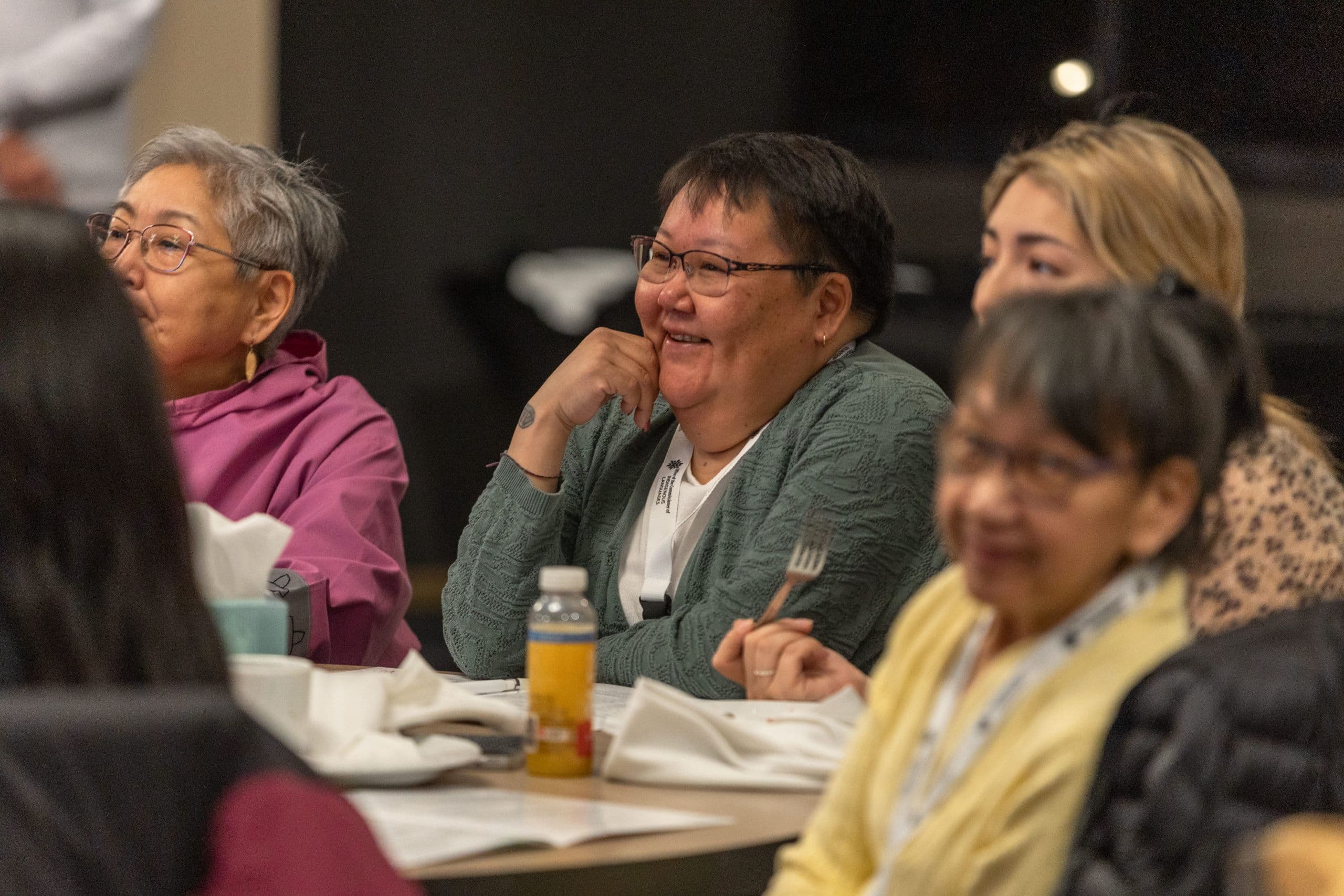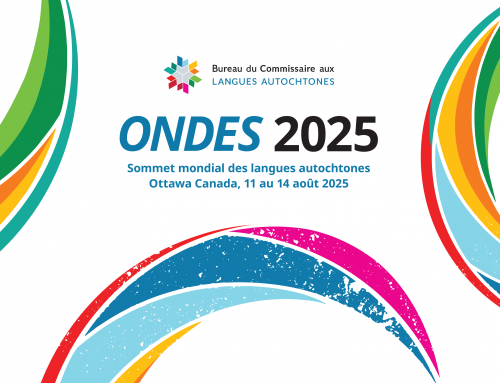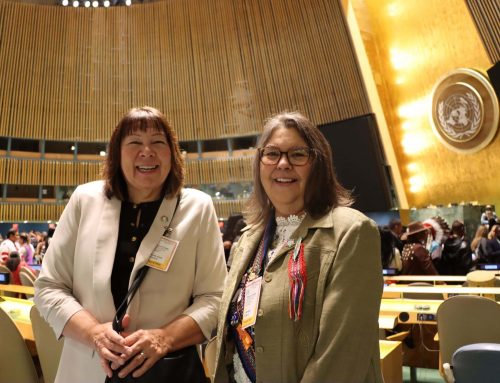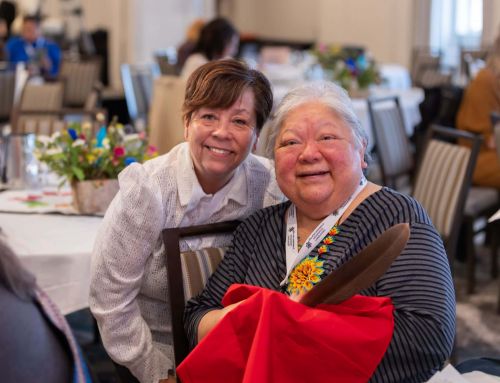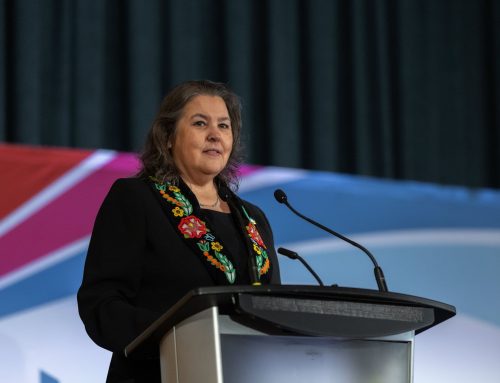Urban Inuit Language Gathering (March 20-21, 2024)
The Office of the Commissioner of Indigenous Languages (the Commission) held a language gathering for urban Inuit in Algonquin unceded territory (Ottawa, ON), bringing together over 60 participants. The two-day gathering, began with an evening reception at the Royal Canadian Geographical Society, MCed by Director Robert Watt. Over the course of two days, Inuit language keepers, Elders, and youth came together in meaningful dialogue focused on the reclamation, revitalization, maintaining, and strengthening of Inuktut. The gathering had diverse representation, with fluent and beginner speakers as well as presenters and panelists from urban, rural, and remote communities. 
Shirley Tolley of Kitigan Zibi welcomed participants to their traditional and unceded Algonquin territory. Commissioner Ronald Ignace expressed the Commission’s gratitude for having targeted dialogue on the perspectives that are distinct and unique to Inuit. President Natan Obed from Inuit Tapiriit Kanatami (ITK) provided opening remarks and Eelee Higgins blessed the food. This blessing was especially perfect coming from Higgins, whose life’s work has been deeply invested in educating, developing, and promoting Inuktitut.
After a flavourful dinner of traditional Inuit foods, participants witnessed a vibrant evening of entertainment beginning with spoken word poetry bestowed by award-winning Taqralik Partridge. The crowd then welcomed another award-winning artist, Beatrice Deer, who performed alongside her bandmates Christopher McCarron and Mark Wheaton. Before participants retired for the night, Director Watt and Deer enthralled the crowd with a throat singing performance.
On day two, an opening prayer and lighting of the Qulliq was offered by Eelee Higgins. Commissioner Ignace shared a keynote speech on his personal Secwepemctsin language journey, his mission to fight for Indigenous languages, the journey of establishing the Commission, as well as its mandate.
Director Watt divided the room to participate in four breakout sessions on the topic of protecting Inuktut. These discussions each outlined many ways that can help Inuit collective efforts, such as policy reform, increased funding, and the inclusion of urban groups in resource allocation. Once the breakout room sessions concluded, all participants returned to the main gathering room where they heard a keynote on efforts related to the unification of Inuktut from ITK representatives Benjamin Mitsuk (Manager of Economic Development, Education and Culture) and Jesse Fraser (Communications Advisor).
Following this, Jimmy Uqittuq, a teacher from Kangirsujuag, moderated the Youth panel discussion. Panelists included Sarah Samiak, Eva Papak Arnatok, Philip Tulugak, and Mumlu Atagotaaluk who shared their perspectives on the future of Inuktut. They shared about the importance of relationship and community. This discussion transitioned to the facilitated discussion on the role of technology in building momentum and inspiring others with filmmaker Jobie Weetaluktuk and Zebedee Weetaluktuk, who have a TikTok page dedicated to teaching Inuktitut.
Another panel discussion was held and moderated by Director Watt. Discussing language and service provision in urban environments, panelists included Stephanie Mikki Adams, (Executive Director of Inuuqatigiit Centre for Inuit Children, Youth and Families) and Rita Novalinga (Tungasuvviingat Inuit).
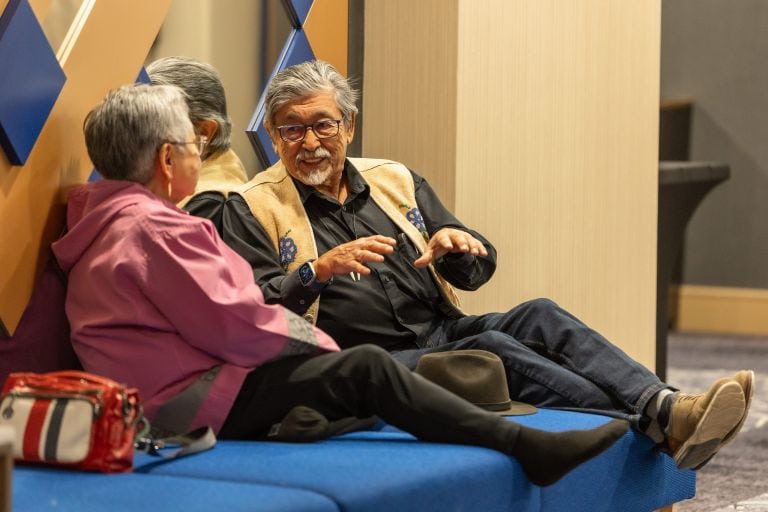 Finally, a show and tell of books and resources was presented by Monica Ittusardjuat from Inhabit Education. Ittusardjuat – a residential school Survivor, author, former teacher, and former National Inuit Language Coordinator with ITK – has decades of experience, a wealth of knowledge in Inuit language and culture, and a passion for ensuring that Inuktut thrives for generations to come.
Finally, a show and tell of books and resources was presented by Monica Ittusardjuat from Inhabit Education. Ittusardjuat – a residential school Survivor, author, former teacher, and former National Inuit Language Coordinator with ITK – has decades of experience, a wealth of knowledge in Inuit language and culture, and a passion for ensuring that Inuktut thrives for generations to come.
Facilitators wrapped up their discussions and Commissioner Ignace returned to the podium to offer closing remarks. Eelee Higgins delivered a closing prayer, as she extinguished the Qulliq.
Through all the discussions, presentations, and dialogue held over the two-day gathering, many ideas and concerns were brought forward as key steps in the path forward as Inuit reclaim, revitalize, maintain, strengthen, and increase fluency.
Long-term, sustainable funding is necessary to make this happen. Funding is critical to help hire, retain, and support teachers and educators who are doing the heavy lifting of language revitalization efforts. It was also often acknowledged that great and innovative ideas often stem from discussions around technology and the use of AI, which could potentially help with digitizing archives, developing apps and games, etc.
Throughout the two-day gathering, it was evident that language plays a large part in healing from intergenerational trauma and shame and healing can be achieved through language. After hearing from so many brilliant people at this gathering, there is much hope for the future of Inuktut.
